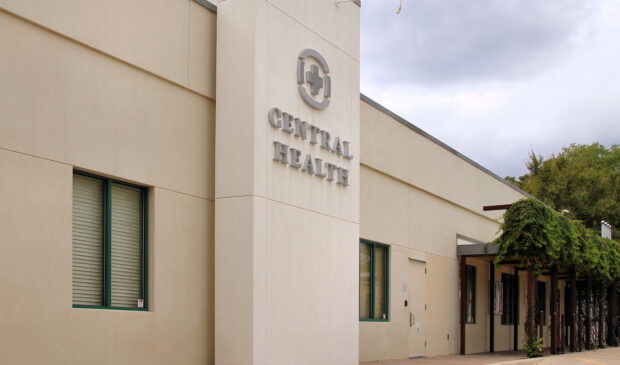Central Health board focuses on equity as it expands access to specialty care
Thursday, April 25, 2024 by
Nick Erichson Following a 2018 performance review, Travis County hospital district Central Health analyzed the county health care system, searching for service gaps among its target safety-net population. The county queried its population’s access to eight lines of service, from primary to specialty and dental care.
The report returned checkered in bright red, reporting severe or moderate-to-severe gaps in every area assessed. Specialty care, dental care, hospital services and post-acute care demanded the most critical need, and in no area did more than 75 percent of residents receive adequate care.
In 2022, Central Health implemented its Health Equity Action Plan, a strategic planning process meant to centralize and guide budget priorities over the following seven years – and placate a historically frustrated Commissioners Court.
On April 10, staff met with the Central Health Board of Managers to consider their Health Equity Action Plan, assessing activities in Fiscal Year 2023 and discussing plans for the future.
The mood in the room was inspired as staff and board members reviewed their efforts to extend multiple new lines of service, diversify and expand access to specialty care, fortify partnerships and work toward operations at new sites. They celebrated numerous victories, having achieved the advent of services well ahead of schedule.
In 2023, Central Health built out clinics with the capacity for a wide range of specialty care. Eligible county residents may now be seen for a full spectrum of services, including gastroenterology, pulmonology, podiatry, wound care, nephrology, palliative care, hepatology, infectious disease, cardiology and diagnostic testing for pre-surgical clearance, a wraparound spectrum of care that could outpace most outpatient clinics. Central Health has also made or is in the process of completing hires for behavioral health and cardiology specialists and plans to offer neurological care soon.
Central Health has also scaled up its mobile medicine operations and partnerships, expanded its footprint in hospitals (soon, it hopes, including an expansion to St. David’s HealthCare) and began serving patients at its proprietary skilled nursing facilities – inpatient rehab and medical treatment centers which serve as an intermediary between hospital and home.
In the coming weeks, it will open the doors of its own respite care center.
“Respite care gives people experiencing homelessness a safe place to recover while accessing medical care and other social service needs,” a representative of Central Health said, rather than returning to the streets, where – in the best case – they’re likely to end up back in the emergency department again.
“Our providers will do anything but discharge patients,” said Dr. Alan Schalscha of Central Health. “Somebody’s raising their voice because, you know, they’ve got behavioral health challenges – we can help work and augment behavior based on just medical management and really curtailing care plans for these patients. But discharging them means we discharge them to the street, which means they bounce right back.
“Whether you’re looking at the humanity aspect of care or the financial aspect of care … you don’t hit both by just discharging a patient,” he said.
In another step toward stewardship of its patients this year, Central Health made the transition to an electronic health record system, which it says will be useful in tracking quality metrics on patients over time.
The organization is also collaborating with Travis County and the sheriff’s department to provide medical services at the Travis County Jail.
“We’re starting with service lines that are currently offered at Central Health specialty clinics – for example, podiatry X-rays, which we can perform inside our own clinics,” a representative said.
The past years have posed a critical period for the organization, which has faced embattled budget seasons, pending litigation with partner Ascension Seton and a second independent assessment by auditor Mazar. The audit comes especially relevant to the group’s long-spotlit transactions with Dell Medical School.
The 2018 study by auditing firm Germane Solutions emphasized that Central Health stands as an outlier in surrounding areas as the only hospital district that does not actually operate a hospital. Indeed, until 2024, the organization entirely contracted out to CommUnityCare and other organizations.
“Central Health delegates control over care delivery to its partners, which can limit Central Health’s ability to make immediate changes to its service portfolio or communicate potential changes in advance to the community,” the Germane report says.
The Health Equity Action Plan – in stark contrast to the organization’s operations until now – calls for building out services almost entirely in-house. In 2023, Central Health – contracting out primarily to CommUnityCare – did not operate a single branded clinic. In the immediate future, it plans to operate four, along with at least two facilities providing respite beds, specialty medical care and in- and outpatient substance use treatment.
Central Health may have taken services in-house for a number of reasons, including novel management paradigms under new leadership. But, occurring soon after a soured relationship and ongoing lawsuit with major partner Ascension, it is also difficult to ignore the fact that dispensing of contracted partners will shield Central Health from any future such disputes.
In the coming months, Central Health staff and board members will continue to refine their Health Equity Action Plan leading up to the FY 2025 budget priorities and proposal before the Travis County Commissioners Court.
Photo by Larry D. Moore, CC BY-SA 4.0, Link.
The Austin Monitor’s work is made possible by donations from the community. Though our reporting covers donors from time to time, we are careful to keep business and editorial efforts separate while maintaining transparency. A complete list of donors is available here, and our code of ethics is explained here.
You're a community leader
And we’re honored you look to us for serious, in-depth news. You know a strong community needs local and dedicated watchdog reporting. We’re here for you and that won’t change. Now will you take the powerful next step and support our nonprofit news organization?







